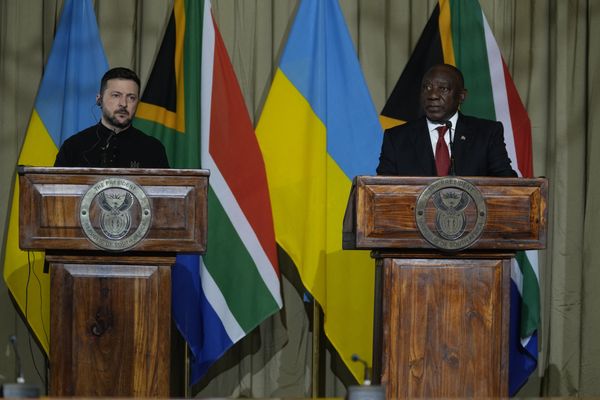
World leaders are gathering in Beijing for China’s belt and road initiative (BRI) forum, the third such event since the trademark global development drive was launched by President Xi Jinping 10 years ago.
The BRI was originally envisioned as a vast physical and digital infrastructure project to connect China with central Asia, south-east Asia, Europe and the rest of the world. It later broadened into a mammoth infrastructure financing vehicle for Chinese lenders to support projects in nearly every corner of the world, particularly in the global south. With that support came China’s mounting influence on the world stage, even as western countries became increasingly sceptical of the BRI.
In one of the biggest international conferences since China abandoned its zero-Covid policy at the end of last year and reopened borders, the BRI summit is as notable for its absences as for those attending.
Of the more than 130 countries going to the two-day summit, which kicks off on Tuesday, the most senior representative from the EU is expected to be Viktor Orbán, Hungary’s prime minister, who is much more supportive of China than other leaders in the bloc.
Analysts see Xi making a renewed focus on engagement with the global south, as relations with the west are increasingly frosty.
Other notable guests include the Russian president, Vladimir Putin, and a representative of the Taliban. The last time Putin visited Beijing was shortly before his troops invaded Ukraine.
Putin – who has travelled little abroad since the international criminal court (ICC) issued an arrest warrant for his arrest in March – arrived in Beijing on Tuesday. The ICC’s warrant obliges the court’s 123 member states to arrest Putin and transfer him to The Hague for trial if he sets foot on their territory. China is not a member of the ICC
The invitation of Putin to Xi’s flagship summit was effectively an “outvite” to western governments and organisations, said Christoph Nedopil Wang, the director of the Griffith Asia Institute. It emphasises the alignment of Chinese and Russian political priorities, even as Beijing has tried to position itself as a peacemaker in the Ukraine conflict.
Russia has made similar overtures. On Monday it said that it was joining China in restricting imports of Japanese seafood amid concerns about contamination related to the release of wastewater from the Fukushima nuclear plant. Some analysts argue that the restrictions are motivated by political rather than safety concerns.
But the attendance of Putin at the BRI, despite the fact that Russia has not officially signed up to the initiative, underlines the close relationship between the two countries. Xi hopes to use the forum to promote China (and Russia’s) “multipolar” worldview that they argue gives the global south more agency. The offer is increasingly a political one, as the amount of financing available – and desired – through the BRI has tapered off.
Recent research published by Boston University found that while China’s development finance institutions provided about $331bn (£271bn) to recipient countries between 2013 and 2021, “many of the recipients of Chinese finance are subject to significant debt distress”. China has also spent about $240bn bailing out countries struggling with their BRI debts, according to separate research published earlier this year.
BRI financing was increasingly focused on smaller projects, with specific aims relating to social or political goals, said Linda Calabrese, a research fellow at ODI, a global affairs thinktank. That is a shift that is also driven by borrowers who are increasingly concerned about ending up in situations of unmanageable debts or infrastructure projects.
It is a marked difference from when the BRI was launched in 2013. Xi, then newly minted as China’s leader, seemed like an ascendant force on the world stage. Beijing promised to support countries that had not been served by traditional multilateral lenders.
But since then there has been a trade war with the US, Russia’s war in Ukraine, a global pandemic and slowing economic growth in China, all of which have dragged on China’s development ambitions. About $1tn of investment has been galvanised under the auspices of the BRI, according to China’s foreign ministry, but the volume of lending to poor countries peaked several years ago.
Last year at the UN general assembly, Xi launched the idea of a global development initiative (GDI), China’s new development concept linked to the UN’s sustainable development goals. That “sharpened the focus of the BRI [as] a more commercial initiative compared to the more classical development-focused GDI”, said Nedopil-Wang.
Beijing also wants to shift to quality rather than quantity when it comes to its overseas lending and investments. In a white paper published last week, the Chinese government said that “the ultimate goal of the BRI is to help build a global community of shared future”. That means focusing on issues such as food security, infectious diseases, artificial intelligence and climate change, according to the white paper, rather than just economic development.
The white paper called for “high-quality growth”, using what has also been a buzzword for China’s domestic economic policy. In recent months, Beijing has tried to position itself as a member of the global south, despite the fact that as the world’s second-largest economy it has a heft on the world stage matched only by the US.
China’s alignment with the global south may be hard to sustain in terms of raw economic development, as China has jumped from being a low-income country to an upper middle-income country in lightning-fast speed. But with the strong focus on the global south at this week’s BRI forum, Beijing is trying to make clear that its offer to the global south is still more attractive than the offer from Brussels or Washington.







